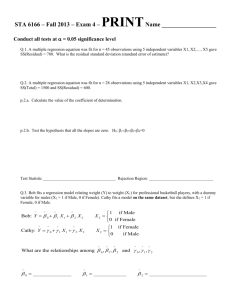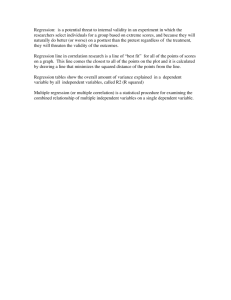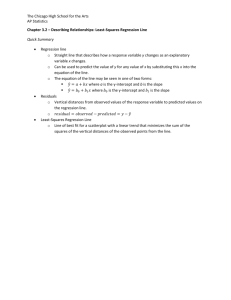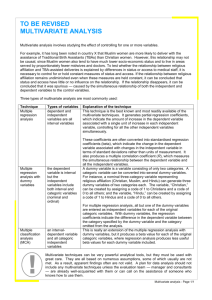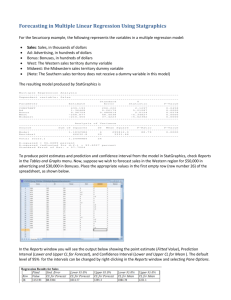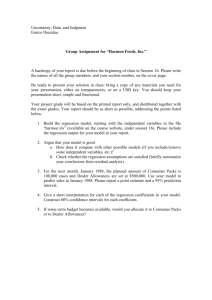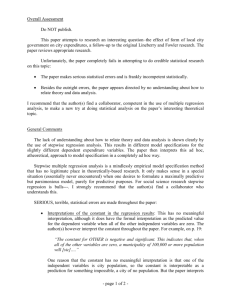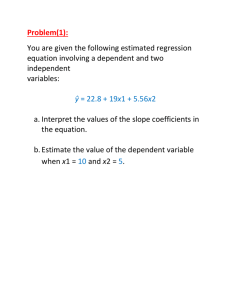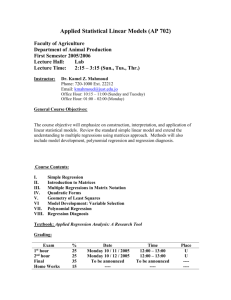running a proper regression analysis
advertisement
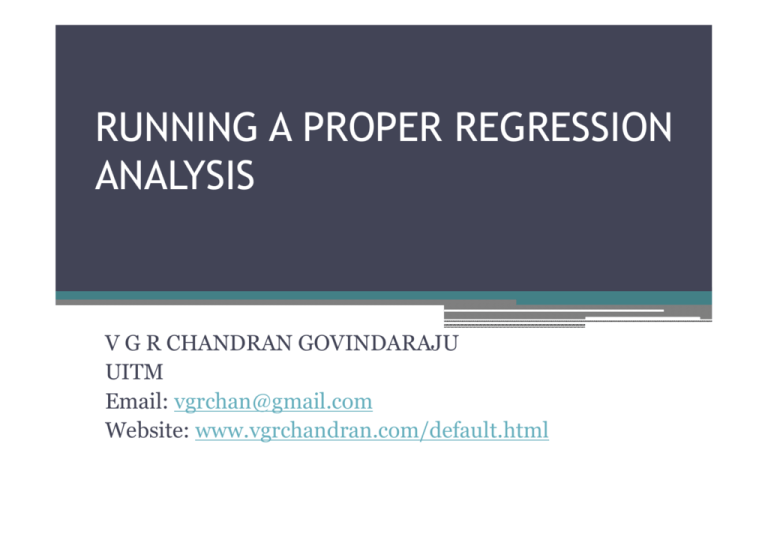
RUNNING A PROPER REGRESSION
ANALYSIS
V G R CHANDRAN GOVINDARAJU
UITM
Email: vgrchan@gmail.com
Website: www.vgrchandran.com/default.html
Topics
Running a proper regression analysis
First half of the day:
1. What is regression?
2. How to estimate? (Simple and Multiple Regression)
3. Checking the assumptions of regression
Second half of the day
1. Regression with dummy variables
2. Recap: Time Series Econometrics
Types of data
• Cross sectional
• Time series
• Panel data
• Where to get the data, DOS and BNM
• Lets download some data
• Data transformation – level data, growth rate,
index numbers, nominal to real values,
exponential to linear models, etc
What to do after obtaining your data?
START
EXPLORE DATA
DEVELOP ONE OR
MORE REGRESSION
MODELS
IS ONE OR MORE
REG. MODELS
SUITABLE FOR DATA
IDENTIFY MOST
SUITABLE MODEL
MAKE INFERENCES
& REPORT
no
REVISE THE MODEL
/NEW MODEL
Explore the data
• Data cleaning
• Feel your data –
▫ Descriptive Statistics
▫ Correlations and Plots
What is regression?
• Relationship between two variables (simple) or
more than two variables (multiple)
• Models:
Y = α + βX + ε
• α is the intercept
• β is the coefficient
• ε is the error term
Regression (Simple Example)
n
1
2
3
4
5
6
7
8
9
10
11
12
13
14
y
23
29
49
64
74
87
96
97
109
119
149
145
154
166
x
1
2
3
4
4
5
6
6
7
8
9
9
10
10
What is regression? (continue)
SIMPLE EXAMPLE
•
•
•
•
Lets plot the data – scatter plots
Fitting a regression line.
Findings the error term (residuals)
Residuals are the most important part of
regression (will let you known why later)
Estimating the alpha and beta.
• Using Excel, SPSS, Eviews, Microfit, STATA,
SPLUS
• Will teach how to use Excel, EVIEWS and SPSS
(just an overview)
• Interpreting the outputs
Things to evaluate (output)
• Economic Criteria – signs and size of the effects
(coefficient) – follows economic theory –
demand for food (price variable)
• Coefficient of determinants
• Significance test on parameters (also joint test)
• Model selection criteria
• Functional form
• Econometric criteria - assumptions (do not
violate)
Assumptions of linear regression
•
•
•
•
•
Linearity
Normality
Autocorrelation/Serial Correlation
Heterogeneity
Multicollinearity
Linearity
• Straight enough condition (scatter plots)
• SPSS: Graphs: Scatter: Matrix: enter the
dependent (outcome) variable first and then
each of the independent variables
(categorical/nominal variables don’t need to be
entered, but do it anyway to see what it looks
like).
• SPSS: Analyze: Regression: Linear:
• Ramsey RESET test.
Normality
•
•
•
•
•
We do not need to test each series
Just test the residuals
Jarque-Berra statistics or the QQ and PP plots
We use JB stat.
Null Hypo: Normal
• What to do if data is not normal?
▫ Increase sample size
▫ Transform data – e.g. log values – Data may not
be normal b’cause of specification problems or
functional form. Remember linearity
Serial Correlation/AutoCorrelation
• Likely a problem in time series data especially
data with short frequency
• What cause autocorrelation?
▫ Omitted variables
▫ Misspecification
• Consequences of autocorrelation
▫ OLS estimators will be inefficient
▫ Variance of the coefficient will be biased and
inconsistent
How to detect autocorrelation
• Graphical methods: plot the residual and also
draw a scatter plot of residual against residual (1)
• Durbin-Watson test – Eviews (Null Hypo: no
autocorrelation)
• Application –when model includes constant,
only first order and no lagged dependent
variables
• We have a table to compare (DW stat) to the
critical values (but rule of thumb – if the value
nears 2 than it is ok
How to detect autocorrelation
• Breusch-Godfrey test for serial correlation
• It can test higher orders
• Eviews – View/Residual tests/serial correlation
LM test
How to solve autocorrelation?
• Cochrane-Orcutt iterative procedure (beyond
our scope – remember I said regression in plain
English
• AR (1)
Test for specification
• Ramsey’s RESET test
• We include the predicted dependent variable as
one of the regressors
• Lets do it in eviews
Heteroskedasticity
• The opposite of homoskedasticity
• Hetero means unequal; Homo means equal
• Second part of the word “skedasticity” means spread
(variance)
• Example: Consumption – rich and poor – rich have
better spread (save and consumption) poor have
lower spread
• There are many ways to test hetero :
• Graphically – plot residual squared against
dependent or independent variable – there must not
be a systematic pattern
• However graphical methods can be used for
multiple regression
Heteroskedasticity
• The following test can be used:
▫ Breusch-Pagan LM test, Glesjer LM Test, HarveyGodfrey LM test, Park test, Goldfeld-Quabdt test,
and White test
▫ Lets use the White test
▫ Null Hypo: No hetero or homo
Consequence of hetero and ways to
correct it
• No change in estimated parameter but standard
error is effected (so does the significant)
• Generalized (or weighted ) least squares (beyond
or discussion)
• Run a heterogeneity corrected regression (lets
do a simple (White corrected standard error
estimates)
• Alternatively, we can also use dummy variables
to account for hetero
Multicollinearity
• Whether there is any relationship between the
regressors
• Consequences – parameter is indetermine if perfect
multicollinearity (However, real data do not have
perfect multicollinearity)
• Imperfect multicollinearity – when regressors are
correlated but less than perfect
• How to detect?
▫ Correlation matrics
▫ Check the significance of individual coefficient (t-test)
and the joint significance (F-test)
▫ Run the regression by separating the regressors
▫ VIF – Eviews or in SPSS (VIF value of less than 10 is
ok)
Structural break and parameter
stability test
• Aim is to see whether parameters of the models
have been constant over the periods
• Chow test – we have to know the point of the
break
• CUSUM and CUSUM Q Test – parameter
stability
24
Regression Analysis with Dummy
Variables
y = b0 + b1x1 + b2D2 + . . . bkxk + u
25
Dummy Variables
• A dummy variable is a variable that takes on the
value 1 or 0
• Examples: male (= 1 if are male, 0 otherwise),
south (= 1 if in the south, 0 otherwise), etc.
• Dummy variables are also called binary
variables, for obvious reasons
26
A Dummy Independent Variable
• Consider a simple model with one continuous
variable (x) and one dummy (d)
• y = b0 + d0d + b1x + u
• This can be interpreted as an intercept shift
• If d = 0, then y = b0 + b1x + u
• If d = 1, then y = (b0 + d0) + b1x + u
• The case of d = 0 is the base group
27
Economics 20 - Prof.
Anderson
Example of d0 > 0
y
y = (b0 + d0) +
b1x
d=1
d0
{
slope = b1
d=0
}
b0
y = b0 +
b1x
x
28
Dummies for Multiple Categories
• We can use dummy variables to control for
something with multiple categories
• Suppose everyone in your data is either a HS
dropout, HS grad only, or college grad
• To compare HS and college grads to HS
dropouts, include 2 dummy variables
• hsgrad = 1 if HS grad only, 0 otherwise; and
colgrad = 1 if college grad, 0 otherwise
29
Multiple Categories (cont)
• Any categorical variable can be turned into a set
of dummy variables
• Because the base group is represented by the
intercept, if there are n categories there should
be n – 1 dummy variables
• If there are a lot of categories, it may make
sense to group some together
• Example: top 10 ranking, 11 – 25, etc.
30
Interactions Among Dummies
• Interacting dummy variables is like
subdividing the group
• Example: have dummies for male, as well as
hsgrad and colgrad
• Add male*hsgrad and male*colgrad, for a
total of 5 dummy variables –> 6 categories
• Base group is female HS dropouts
• hsgrad is for female HS grads, colgrad is for
female college grads
• The interactions reflect male HS grads and
male college grads
31
More on Dummy Interactions
• Formally, the model is y = b0 + d1male +
d2hsgrad + d3colgrad + d4male*hsgrad +
d5male*colgrad + b1x + u, then, for example:
• If male = 0 and hsgrad = 0 and colgrad = 0
• y = b0 + b1x + u
• If male = 0 and hsgrad = 1 and colgrad = 0
• y = b0 + d2hsgrad + b1x + u
• If male = 1 and hsgrad = 0 and colgrad = 1
• y = b0 + d1male + d3colgrad +
d5male*colgrad + b1x + u
32
Other Interactions with Dummies
• Can also consider interacting a dummy variable,
d, with a continuous variable, x
• y = b0 + d1d + b1x + d2d*x + u
• If d = 0, then y = b0 + b1x + u
• If d = 1, then y = (b0 + d1) + (b1+ d2) x + u
• This is interpreted as a change in the slope
33
Other use of dummy variables
•
•
•
•
Seasonal dummy
Structural breaks
Shocks
etc
Lets Recap Our Time Series Analysis
•
•
•
•
Unit Root Test
Cointegration
Vector Error Correction Model
Granger Causality
Must Have Books (for new researchers)
Pratical Data Analysis
• Gary Koop (2004) Analysis of Economic Data, John
Wiley.
Basic Econometrics
• Gary Koop (2008) Introduction to Econometrics, John
Wiley
• Samprit Chatterjee, Ali S. Hadi, Bertam Price (2000)
Regression Analysis by Example, John Wiley.
• Dimitrios Asteriou and Stephen G. Hall (2007) Applied
Econometrics: A Modern Approach Using Eviews and
Microfit, Palgrave
Basic Statistics and Regression Models
• De Veaux, Paul Velleman and David Bock, Stats: Data
and Models, Pearson. (for basic statistics)
Thank you
QUESTIONS PLEASE
More materials will soon be available (by end of the
month) through my website:
www.vgrchandran.com/default.html

